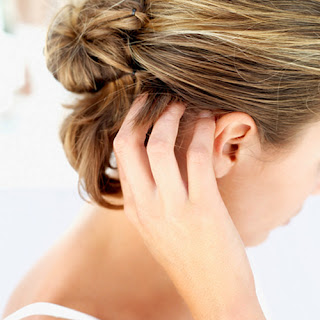 |
| Itchy Scalp |
One of the most common forms of eczema is eczema on the scalp or scalp eczema. It is common on men and women, adults and children. Eczema affects various parts of the body but is most common on the hands, legs or scalp. Eczema of the scalp is different than other forms of eczema, simply because the skin on your scalp is unique compared to other bodily skin. This uniqueness is what makes eczema on the scalp so prevalent.
Sebaceous glands, present on the scalp, contribute to eczema by producing a large amount of grease. This is magnified by hair follicles which produce their own secretions. Factors like the environment also affect your scalp. Direct sunlight, heat and humidity in the summer and cold in the winter complicate things. All these things work to produce eczema on the scalp.
Eczema on the scalp has been categorized into two different forms. Environmental and internal eczema. Irritant contact eczema, allergic contact eczema and herpericum eczema are all the forms of environmental eczema. There are lots of different types of internal eczema including atopic, seborrhoeic, nummular, madidans, ruburn, pustulosum and asteototic.
Eczema on the scalp skin condition is predominantly seborrhoeic dermatitis. It causes irritation and itching. This loosens oily, greasy scales of skin off the scalp that flake off. It is also known as it more common term dandruff. Although this form of eczema is more common in men than women, both genders are susceptible to it. Eczema on the scalp in commonly seen in adults aged 30 years to 60 years.
Common symptoms of eczema on the scalp are itchy scalp, inflamed and red scalp. There are oily and yellowish scales that can flake off. Greasy skin patches on the eyebrows and behind the ears are also very common. There are a few theories about the causes of eczema on the scalp. One popular theory of dermatologists is a hormonal imbalance. Other dermatologists contend that it is caused by a fungus.
There are foods you can eat that will help in your battle against eczema on the scalp. These include fish, rich in Omega 3 oil, and salad. Medical solutions include anthralin, pyrithione and salicylic acids. Corticosteroids are also useful in battling eczema on the scalp.
One of the best non-medicinal treatments for eczema on the scalp is fish oil. Apparently the Omega 3 is an effective healing agent for scalp eczema. The consumption of fish oil will take time to show up in your treatment. It can take up to six months to see any sign of improvement. One is the advantages of Omega 3 fish oil supplements is the ready availability. It is inexpensive and can be taken as pills or just consuming fish will give you the benefits of the essential fatty acids that fish oil contains. The body uses these fatty acids to break down enzymes and particles that are active in people with eczema on the scalp.
Having green vegetables in your salads also help with eczema on the scalp. It has been known for some time the green vegetables have great benefits for your skin. Green vegetables and alfalfa sprouts both contain antioxidants which rids the body of harmful bacteria and microbes. These elements cause the irritation and discomfort.
Published At: www.Isnare.com
Related Topics :
Falling Hair? Cure It With Simple Scalp Exercise
Understanding The Severity of Scalp Infections
Use a Hair Brush Every Day to Improve Scalp Circulation to Make Your Child's Hair Strong and Healthy
The Basic of Hair and Scalp Conditioning
Male Hair Loss : Natural Hair Loss Treatment